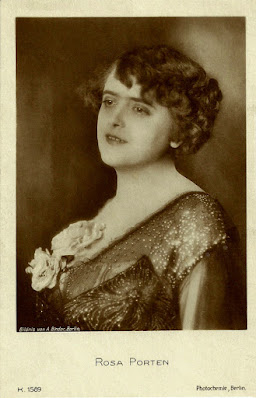 |
| [Source: Wikipedia] |
1884-1972
Spit-fire, comically intelligent and groundbreaking German writer, director and silent film actress Rosa Porten was born on this day in Düsseldorf. She was the daughter of performer turned early film director Franz Porten, and the sister of the much more famous actress Henny Porten. Much much more than just an actress; she was also a very talented script writer and director in her own right, though she did enter the film industry as an actor. Unsurprisingly, she made an appearance, along with her younger sister, in one of their father's films in 1906. Meißner Porzellan was a little four minute short shot by their father Franz in only his second turn behind the camera. Her father made films for the early German production company Messters Projektion, founded by inventor Oskar Messter; Messter himself made films, usually of a psuedo-documentary type. Rosa Porten's next appearance in a film came in one of these Messter films and is actually quite interesting historically. She and her sister appeared in the short film Apachentanz (or Apache Dance) in 1906. The dance, which had nothing to do with the Native group in the American southwest, had become a dance craze in the clubs of Paris, much like the Charleston became closely associated with "flapper" culture of the 1920's. The dance, which may or may not have originated in Spain, was often performed to tango or other Spanish style music, was not strictly choreographed and resembled some tango styles, but always involved some form of partner insistence on the dance, followed at some point by "partner rejection." It is unclear where the name originated from, but it may have come from the native group...but there is some evidence that it didn't as it is pronounced "A-posh-ee" or "A-poe-shay" (modern renditions can be found on YouTube). In any case, Messter had seen the dance on a trip to France and conceived to put onto film, with the help of Franco-German singer turned film enthusiast Albert Kutzner. Though the Porten sister's are only listed cast in this little film, stills from the film show a man at the point of rejection...I don't want to assume that this is Kutzner, though it's possible. Records show that she did not appear in a film again until 1908 (though these records are thought to be woefully incomplete). In 1908, her father undertook a short production of Shakespeare's Othello in which she was cast as Emilia; the film was ultimately released in their native Germany in 1909, but premiered in Denmark on the 7th of September, 1908. During the next two years, she appeared in six more films, all of them directed by her father and featuring her sister as a member of the cast. She then went four years before appearing again in a film. In the meantime, she had written at least two scripts and made her own directorial debut. She alone wrote the short Das Liebesglück der Blinden in 1911; the film starred her sister Henny and was co-directed by Heinrich Bolten-Baeckers and Curt A. Stark (who would marry Henny Porten the following year). She also wrote the 1915 Hans Oberländer directed Abgründe, which featured German actress Toni Sylva. As a script writer, she was by far more prolific in her career, than she was as an actress. In 1916, she made her directing debut, co-directing,along side Franz Eckstein (to whom she was married), Der Konkneipant, a film that they both also wrote together. As a directing pair, they collectively used the name Dr. R. Portegg. She resumed her acting career that same year, also in a film that she wrote for the pair to direct: Die Wäscher-Resl. The surviving records of her work show that most of her scripts were made into films by herself and husband; but in 1920, a script she had written in two parts was produced into two films, both directed by Léo Lasko: Auri Sacre Fames, 1. Teil and Auri Sacre Fames, 2. Teil. Though she most certainly appeared in many more films than just the 25 she is credited with (some put the number at double that), there is no evidence that she appeared in films much past the mid-1920's. The last recorded film in which she acted was drama Ihr schlechter Ruf, released in February of 1922; she had herself had adapted the Marie Madeleine novel for script. We know that she continued in the film business until nearly 1930, mostly writing. Her scripts included an adaptation of Ibsen's Hedda Gabler in 1925. She also co-penned the last known film that she was involved in, Die Heiratsfalle (January 1928), which she also co-directed with her husband. Her scripts, which featured women as leading characters, have been called very strongly feminist for their time; along with smartly comical. The few films of hers that do survive are favorites of feminist film festivals and have also been featured (at least twice) in UNESCO's celebration of World Day for Audiovisual Heritage, which is celebrated every October 27. She is known have lived with her husband for a time at least in Pommern. She was also an accomplished writer of novels. Her husband died in 1945; and at some point she relocated to Munich, where she passed away on the 7th May of 1972 at the age of 88. I can currently find no information about a burial.
Awesome entry at Columbia's Women's Pioneer Film Project

No comments:
Post a Comment